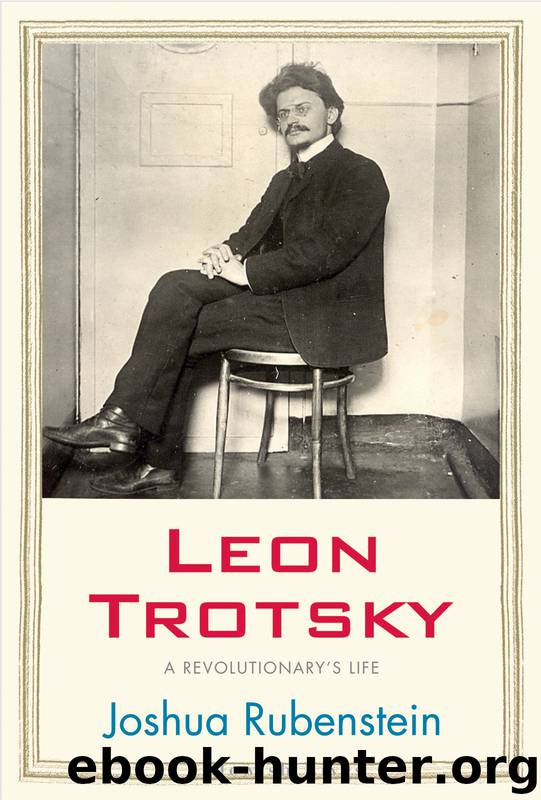Leon Trotsky by Joshua Rubenstein

Author:Joshua Rubenstein
Language: eng
Format: epub
Publisher: Yale University Press
Published: 2011-08-18T16:00:00+00:00
5
Out of Power
THE SUCCESSION WAS not decided at the moment of Lenin’s death. Kamenev and Zinoviev remained allied with Stalin, though both looked down on him. They were determined to prevent Trotsky from coming to power and were confident that their prestige among fellow Bolsheviks would guarantee their dominance. Kamenev, after all, led the party in Moscow, while Zinoviev headed the party in Leningrad and presided over the Comintern.*
Trotsky knew that he lacked a broad following within the party. Only days before Lenin’s death a party conference had denounced his views as “a petty bourgeois deviation from Leninism.” Hoping to restore his authority, he pledged his loyalty at the XIIIth Party Congress in May 1924. “I have never recognized freedom for groupings inside the party, nor do I recognize it now because under the present historical conditions groupings are merely another name for factions.” Then Trotsky tried to ingratiate himself with a party that was changing before his eyes. “In the last analysis, the party is always right, because the party is the sole historical instrument the working class possesses for the solution of its fundamental tasks. … I know that no one can be right against the party. It is possible to be right only with the party and through it since history has not created any other way to determine the correct position.” Trotsky, fearing humiliation and caught within a trap of his own making—a regime controlled by one dominant political party—was now compelled to compete for power within a system where his prestige was evaporating.
He looked for a way to assert his claim on Lenin’s legacy. In the fall of 1924 he published his essay “The Lessons of October.” Anxious to restore his rightful place in history, he described his role in the Bolshevik takeover as Lenin’s principal collaborator. He also highlighted the failings of Kamenev and Zinoviev, who had disappointed Lenin in the spring of 1917, when they supported the Provisional Government, and then again in the fall, when they opposed an armed uprising. Lenin himself had urged the party to forgive their faults. But Trotsky—out of respect for historical truth or to settle scores—embarrassed them both. His strategy backfired. If Trotsky was ready to dredge up the failings of his rivals, they could hardly be expected to ignore his own.
Stalin took full advantage of the opportunity Trotsky had offered. He orchestrated attacks on “The Lessons of October,” engaging in distortions of history that later ripened into a full-scale assault on historical truth: Stalin, not Trotsky, had been at the center of the Bolsheviks’ military planning. Stalin, not Trotsky, had directed the armed units who took over the Winter Palace. With Stalin’s encouragement, Zinoviev publicly declared, “All the talk about the special part played by Comrade Trotsky is a legend which is spread by officious ‘party’ gossips.”
Trotsky had asserted in “The Lessons of October” that a Bolshevik’s behavior in 1917 was the crucial means of evaluating the credentials of any party militant. No one had worked more closely with Lenin than he.
Download
This site does not store any files on its server. We only index and link to content provided by other sites. Please contact the content providers to delete copyright contents if any and email us, we'll remove relevant links or contents immediately.
| France | Germany |
| Great Britain | Greece |
| Italy | Rome |
| Russia | Spain & Portugal |
Fanny Burney by Claire Harman(25789)
Empire of the Sikhs by Patwant Singh(22176)
Out of India by Michael Foss(16313)
Leonardo da Vinci by Walter Isaacson(11912)
Small Great Things by Jodi Picoult(6101)
The Six Wives Of Henry VIII (WOMEN IN HISTORY) by Fraser Antonia(4795)
The Wind in My Hair by Masih Alinejad(4427)
The Lonely City by Olivia Laing(4122)
The Crown by Robert Lacey(4109)
A Higher Loyalty: Truth, Lies, and Leadership by James Comey(4037)
The Iron Duke by The Iron Duke(3642)
Millionaire: The Philanderer, Gambler, and Duelist Who Invented Modern Finance by Janet Gleeson(3573)
Sticky Fingers by Joe Hagan(3456)
Alive: The Story of the Andes Survivors by Piers Paul Read(3316)
Papillon (English) by Henri Charrière(3273)
Joan of Arc by Mary Gordon(3262)
Stalin by Stephen Kotkin(3089)
Aleister Crowley: The Biography by Tobias Churton(3024)
Ants Among Elephants by Sujatha Gidla(2927)
